How teddy 'meditech' can play nurse to your toddler
- Published
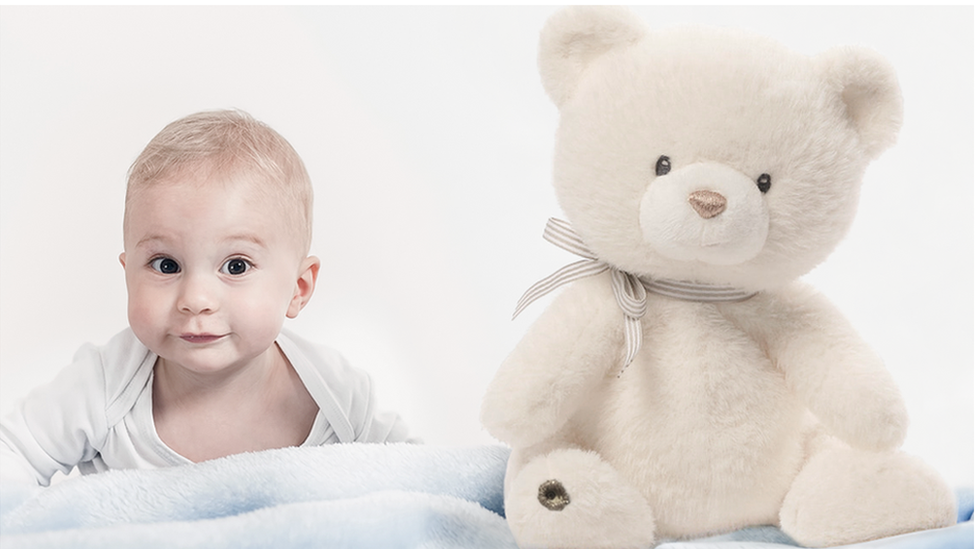
Could cuddly toys be a gentler way to measure your baby's vital signs?
Imagine your child playing with a nice plush teddy bear. Seconds later your little darling's temperature appears like magic on your phone's screen.
Because this isn't any ordinary teddy - it's Teddy the Guardian, a clever diagnostic tool in furry form designed not to alarm kids.
When the bear's paw is squeezed, a sensor inside collects body and ambient temperature data and transmits it wirelessly to a smartphone.
Other toys in the range - the Tall Giraffe and the Brave Lion - measure activity, heart rate and blood oxygen levels.
The idea came from Josipa Majic, 24, a Croatian former informatics student, who has now set up a firm called Teddy & the Guardian Animals with offices in Zagreb, London and California.
"I witnessed closely how, despite having amazing doctors, oftentimes the patient's emotional state got neglected," she tells the BBC.
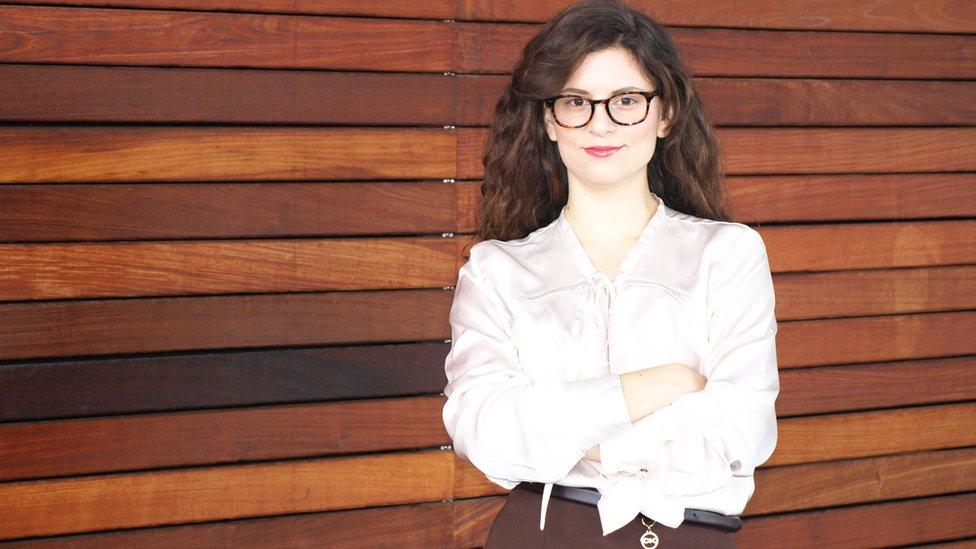
Teddy the Guardian founder Josipa Majic sees big opportunities in healthcare tech
Ms Majic saw big opportunities in the medical technology - or "meditech" - field as "the cost of sensors and components were decreasing and the amount of innovation happening in the field was increasing".
And she is not alone. She is one of many entrepreneurs encouraged by the European Union's Face Entrepreneurship programme aimed at encouraging information technology start-ups.
Falling sensor costs and the growth in secure wireless communications has encouraged a flurry of start-ups in the sector and a mound of new investment.
According to the StartUp Health Insights Annual Report, external, meditech start-ups received about €6bn (£5.1bn; $6.6bn) of investment in 2015, compared to about €1bn in 2010.
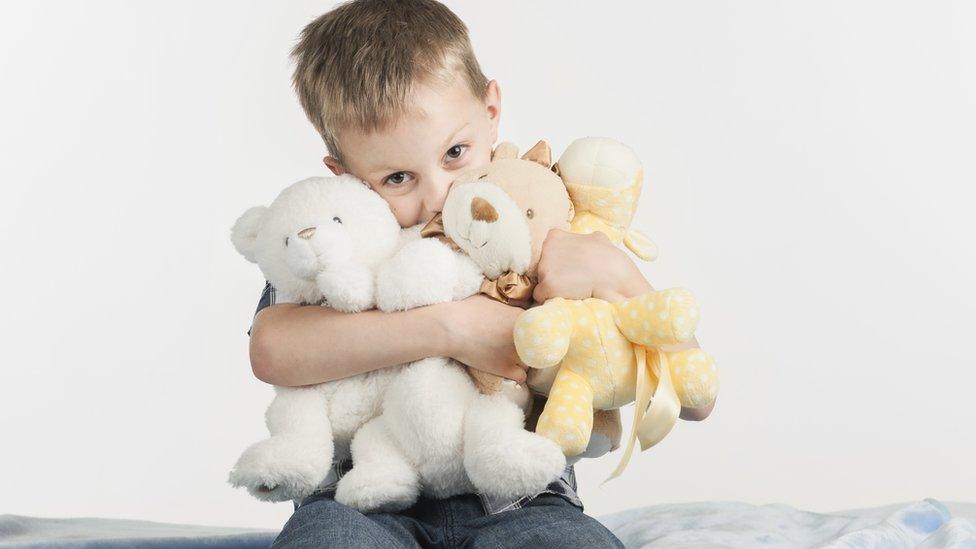
Each of the toys can perform a different health monitoring function
"The healthcare sector is undergoing its most substantial change in decades," says Chris Pennell, lead analyst at tech consultancy Ovum.
"The rise of consumer technologies such as smartphones, wearable devices and mobile health applications, allows citizens to become more involved in their healthcare."
But securing regulatory and quality standards approval for the toys in different countries was a challenge, Ms Majic admits, but one which most meditech firms face.
Body heat
Jose Ignacio Berdu's Thermibody product - a temperature-measuring bodysuit for babies - got off the ground with just €10,000 of investment.
Based in Madrid, Spain, Mr Berdu's firm is staffed with people from a medical background who "are also parents", he says.
The suit sends data to the parent or clinician's phone, which can be programmed to trigger alerts if the body temperature rises to dangerous levels.
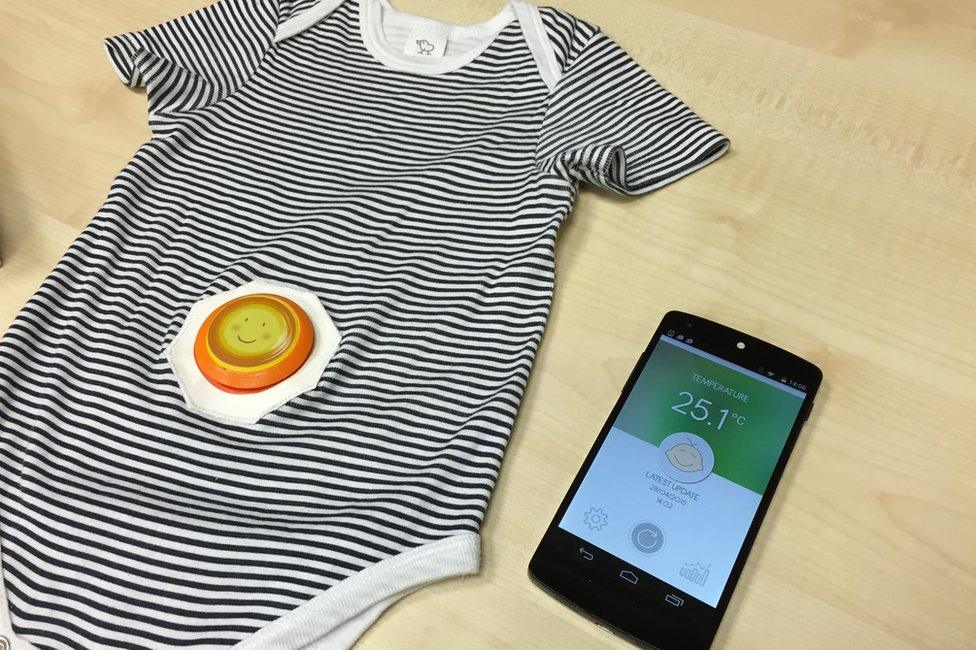
The wireless Thermibody sensor attaches to the babygrow via poppers
The Thermibody begins working as soon as it is put on and stops automatically the moment it is taken off, so there's no danger of forgetting to switch it on.
Mr Berdu says he is currently awaiting the European Union certification required for medical devices.
He believes the product will be popular with first-time parents but also thinks adapted Thermibody suits could be used to monitor for adults in hospitals.
Not so sweet
For Eduardo Jorgensen, the motivation for developing a meditech product was the plight of a 10-year-old girl suffering from diabetes.
"She said she didn't want to use the insulin pump any more because everybody laughed at her at school," says Mr Jorgensen, who is based in Spain.
So he came up with MedicSen, a free application that offers personalised advice for patients with diabetes, helping them control their blood sugar levels.
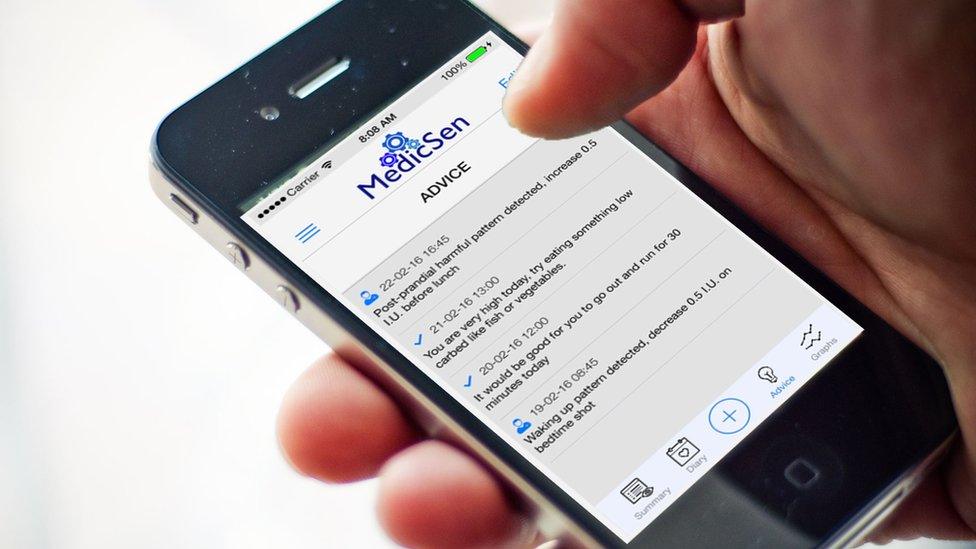
MedicSen's diabetes app learns your body's behaviour and gives advice
Designed to work with a non-invasive patch that simulates the behaviour of the human pancreas, the app's learning algorithm will monitor blood glucose and insulin levels, taking into account factors such as exercise and diet, and come up with advice on how best to manage the condition.
For example, you might receive a smartphone message recommending you cut down on carbohydrates, do some more exercise, or increase the insulin dosage by a certain amount before going to bed.
The app won't be officially launched until October 2016 and is still in the testing phase, says Mr Jorgensen, a doctor specialising in endocrinology.
And the patch will need regulatory approval as a Class 2B medical device, he adds.
Brainy invention
Not all therapies have to involve medicine, of course.
Kim Baden-Kristensen is co-founder and chief executive of Brain+, a Danish company that has developed a "brain training" tool for both healthy people and those suffering from brain injury or depression.
"I was sitting at a cafe in London, reading a book on brain plasticity, when it struck me just how far ahead the scientific understanding of the brain's potential was compared to the mainstream application of this knowledge," he says.
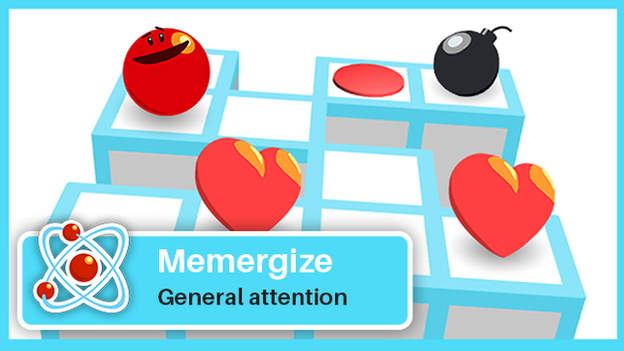
Brain+ apps challenge your mental agility with games and exercises
Part-funded by Copenhagen University, the apps (one free, one subscription-based) aim to improve attention, memory, problem solving, planning and language through a series of exercises and games.
Co-founder Ulrik Ditlev Eriksen says: "We have more than 1.2 million users from all over the world, including hospitals and rehabilitation centres, and we've made some bulk licence agreements with big corporations."
The company believes the brain should be exercised just as much as the body.
Healthy investment
But there are risks associated with this tech-driven trend towards self-diagnosis, monitoring and even treatment.
"Searching the internet for backache or headache treatments is often simpler and quicker than waiting to see a doctor," says Mr Pennell.
"While many will take the results with a pinch of salt, there are those that don't and then go on to self-medicate. Others may look up their symptoms and think it's nothing serious, when it is."

What happens when wearable fitness trackers start being able to dispense medical advice?
Wearable fitness trackers from the likes of Fitbit, Jawbone, Garmin and others have responded to a growing public demand for this basic type of health data.
These devices currently do not need approval from medical regulators because they simply gather data. But the waters become a little murkier when health apps and devices start diagnosing symptoms and imparting medical advice.
And now that the next generation of meditech gadgets are moving into drug administration and management, it presents a whole new set of challenges for regulatory bodies.
On the one hand, a little knowledge can be a dangerous thing; on the other, advances in meditech could save lives and relieve pressure on overstretched healthcare systems.

Follow Technology of Business editor @matthew_wall on Twitter, external